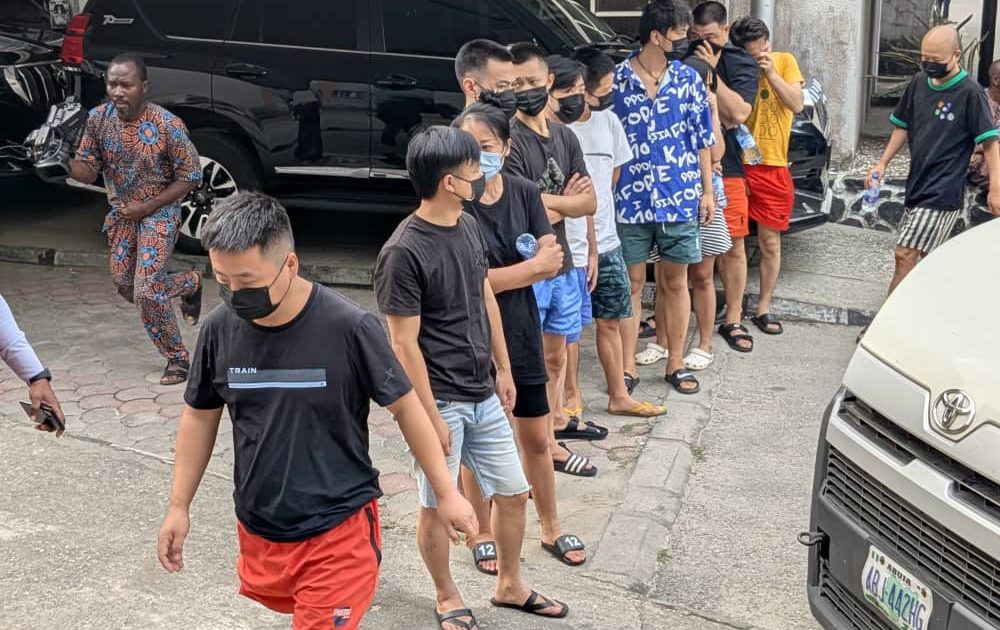This case involves a group of thirteen Chinese nationals and a company, Genting International Co. Limited, facing serious charges in a Nigerian Federal High Court. The charges, brought forth by the Economic and Financial Crimes Commission (EFCC), range from impersonation and fraud to more severe allegations of attempting to destabilize Nigeria’s constitutional structure through cybercrime. The defendants were apprehended at their hideout in Victoria Island, Lagos, following intelligence reports linking them to these illicit activities. Their arrests and subsequent arraignment represent a significant step in combating cybercrime and protecting Nigeria’s national security. The court proceedings highlight the increasing sophistication and transnational nature of cybercrime, requiring diligent investigation and prosecution.
The defendants, identified by names such as Wang Zheng Ming, Li Yin Hui, Xiao Hong Will, and others, have been charged under various sections of the Cybercrimes (Prohibition, Prevention, Etc.) Act, 2015, as amended in 2024, as well as the Advance Fee Fraud and Other Related Offences Act, 2006. The specific charges vary, but many revolve around the alleged use of fake identities online for fraudulent purposes, including romance scams, cryptocurrency fraud, and potentially even cyber terrorism. The EFCC’s investigation uncovered evidence of training programs allegedly conducted by Genting International Co. Limited, instructing employees in these fraudulent practices. This systematic approach to cybercrime underscores the organized nature of the operation and the potential for widespread harm.
The court proceedings have seen most of the defendants plead not guilty to the charges, with one exception: Wang Zheng Ming, who has requested time to secure independent legal representation. Justice Denide Dipeolu, presiding over the case, has scheduled trial dates for February 2025 and ordered the defendants to be remanded in correctional facilities pending trial. The two female defendants are being held at the Kirikiri Female Correctional Centre, while the male defendants have been taken to the Ikoyi Correctional Centre. The court’s decision to remand the defendants reflects the seriousness of the charges and the perceived risk of flight.
The EFCC has outlined several key allegations in its case. One prominent defendant, Liu San Hua, stands accused of orchestrating a scheme involving the recruitment of Nigerian youths to impersonate foreign nationals for financial gain. This particular charge highlights the exploitation of local individuals in facilitating international cybercrime operations. Another significant allegation is leveled against Zhang Xiao Lei and Genting International Co. Limited, who are accused of leveraging computer systems to carry out cyberattacks aimed at disrupting Nigeria’s constitutional structure. This allegation raises concerns about the potential for foreign actors to use cyber warfare to destabilize nations.
Further allegations implicate other defendants in a range of cybercriminal activities. Wang Zheng Feng, also known as A. Feng, is accused of using computer systems to target Nigeria’s economy and social fabric. Luo Jia You, alias A. You, is charged with providing false information to EFCC investigators to conceal his alleged involvement in a syndicate involved in romance scams, cryptocurrency fraud, and cyber terrorism. Guo Xiao Fei faces charges of impersonating a French national to defraud an individual and possessing documents related to romance scams and false identity pretenses. These diverse allegations paint a picture of a multifaceted criminal enterprise engaged in a range of cyber-enabled fraud and potentially more serious threats.
The EFCC’s detailed presentation of the charges reflects the thoroughness of their investigation and underscores the complexities of combating cybercrime in the modern interconnected world. The case against these Chinese nationals and Genting International Co. Limited serves as a stark reminder of the evolving nature of criminal activity and the need for robust legal frameworks and international cooperation to address these challenges. The outcome of this trial will be closely watched, as it could set a precedent for future prosecutions of cybercrime and send a strong message about Nigeria’s commitment to upholding its national security and financial integrity. The implications of this case extend beyond Nigeria’s borders, as it highlights the global fight against cybercrime and the importance of international collaboration in bringing perpetrators to justice. The trial is expected to shed further light on the extent and sophistication of the alleged criminal operation and the potential impact it could have had on Nigeria and its citizens.














